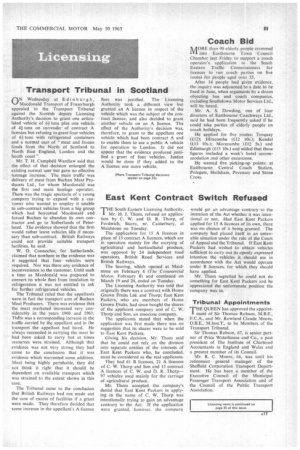Transport Tribunal in Scotland
Page 13

If you've noticed an error in this article please click here to report it so we can fix it.
ONWednesday at Edin burgh, Macdonald Transport of Fraserburgh appealed to the Transport Tribunal against the Scottish deputy Licensing Authority's decision to grant one articulated vehicle of 6-1 tons plus one vehicle of 44 tons on surrender of contract A licences but refusing to grant four vehicles of 61 tons with refrigerated containers and a normal user of "meat and frozen foods from the North of Scotland to North East England, London and the South coast ".
Mr. T. H. Campbell Ward law said that the effect of that decision enlarged the existing normal user but gave no effective tonnage increase. The main traffic was delivery of meat from Buchan Meat Producers Ltd., for whom Macdonald was the first and main haulage operator. There was the tragic spectacle of a young company trying to expand with a customer who wanted to employ it unable to sub-contract vehicles from a big group which had boycotted Macdonald and forced Buchan to abandon its own contractor and go to Sutherlands of Peterhead. The evidence showed that the firm would rather leave vehicles idle if necessary than sub-contract. British Railways could not provide suitable transport facilities, he said.
W. D, Connochie, for Sutherlands, claimed that nowhere in the evidence was it suggested that four vehicles were required. Nor was there any evidence of inconvenience to the customer. Until such a time as Macdonald was prepared to convert its whole fleet from insulation to refrigeration it was not entitled to ask for further refrigerated vehicles.
The Tribunal ruled that the appellants were in fact the transport arm of Buchan Meat Producers. There was evidence that the meat marketed increased very considerably in the years 1960 and 1961. There was a corresponding increase in the traffic carried by the appellant and in the transport the appellant had hired. He always succeeded in carrying the meat he had been asked to carry but at times resources were strained. Although that evidence was not very strong they had come to the conclusion that it was evidence which warranted some addition. Meat being highly perishable, they did not think it right that it should be dependent on available transport which was strained to the extent shown in this case.
The Tribunal came to the conclusion that British Railways had not made out the case of excess of facilities if a grant were made. They therefore decided that some increase in the appellant's A-licence fleet was justified. The Licensing Authority took a different view but granted an A licence in respect of the vehicle which was the subject of the contract licence, and also decided to grant another vehicle on an A licence. The effect of the Authority's decision was, therefore, to grant to the appellant one vehicle which had been contract A and to enable them to use a public A vehicle for operation to London. It did not appear that the evidence produced justified a grant of four vehicles. Justice would be done if they added to the A licence one more vehicle.
































































































